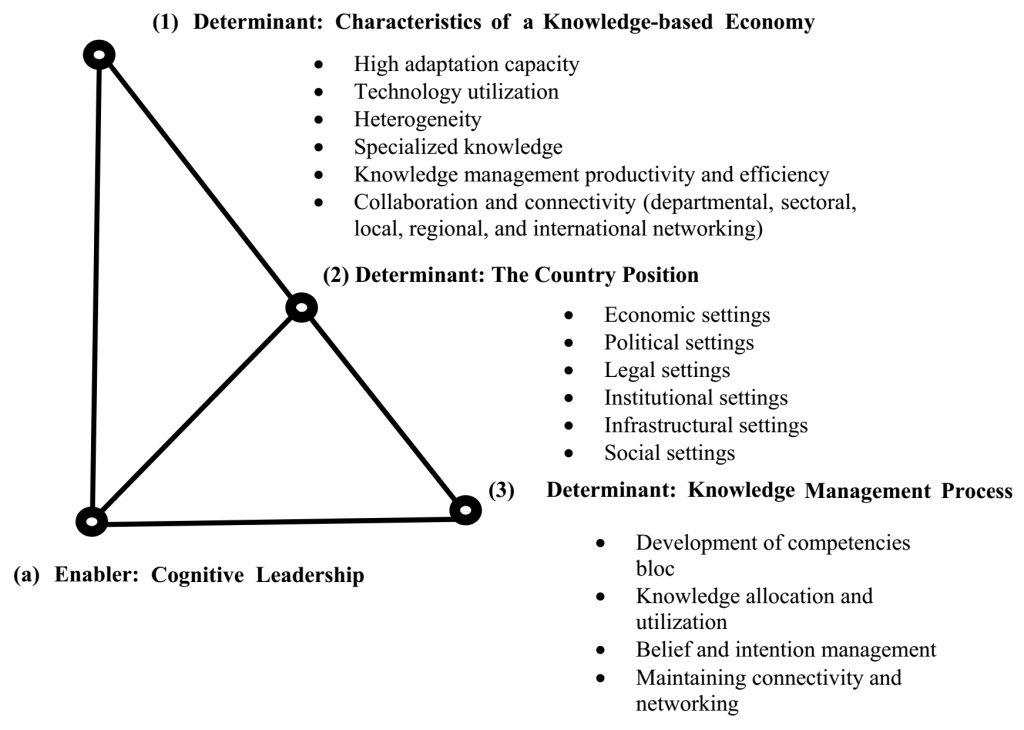
The determinants of knowledge-based economy development at a national level
The Organisation for Economic Co-operation and Development (OECD) advises that:
“The knowledge based economy” is an expression coined to describe trends in advanced economies towards greater dependence on knowledge, information and high skill levels, and the increasing need for ready access to all of these by the business and public sectors.
The concept of a “knowledge-based economy” had its origins in the late 20th century, being advanced internationally by the OECD and the European Union. Many developed countries have since moved towards the establishment of knowledge-based economies. However, developing countries are lagging behind. This is despite recognition that “developing countries that fail to transform effectively into knowledge-based economies will fall further behind more advanced countries, widening the disparities between developed and developing economies.”
One of the significant obstacles to the advancement of knowledge-based economies is a wide diversity of views in the literature in regard to functions, implementation approach, and indicators. Some studies comprehensively identify functions, but have limited detail in regard to the order of implementation. For example, there is inadequate detail in regard to the sequential order of implementation for the functions of the Triple Helix Model, a prominent model of the knowledge-based economy.
Recognising this obstacle, a recent paper1 conducts a systematic literature review to learn from advanced economy practices in knowledge-based economy development and highlight the main pillars, drivers, and processes of a knowledge-based economy.
The systematic literature review was conducted for three selected countries: Sweden, Finland, and Denmark. These countries are considered knowledge-based economy leaders, occupying the top three places on the Knowledge Economy Index.
Aligning with this, Sweden, Finland, and Denmark are also ranked in the top ten countries on the Social Progress Index, and have high per capita GDP.
The systematic literature review first involved a search of Scopus and institutional databases, focusing on journal articles relevant to knowledge-based economy practices in the selected countries. In this step, only the titles, abstracts, and conclusions of papers were examined. The Scopus search returned 74 papers, 31 of which were relevant, while the institutional library search returned 2,153 papers, 134 of which were relevant. Further papers were eliminated following in-depth reading. The final number of the articles was 92, made up of 49 for Sweden, 26 for Finland, and 17 for Denmark.
Conceptual model
From the findings of the systematic literature review, the paper proposes a conceptual model outlining the main determinants and enabler of a knowledge-based economy at a national level. The conceptual model can guide policymakers in developing a national knowledge-based economy framework based on national strategic choices for a country’s competitive position.

The main determinants of knowledge-based economy development and implementation at a national level are: consideration of knowledge-based economy characteristics, the country position in different settings, and the knowledge management process. Cognitive leadership is the enabler of the three main determinants for effective development and implementation of the functions of the knowledge-based economy.
The conceptual model emphasizes understanding knowledge-based economy characteristics within a frame of national strategic choices to increase the value of knowledge assets at the national level. The networking type and strength among main players in the knowledge-based economy should be aligned with this strategic frame, so knowledge-based strategies between countries will differ. Knowledge-based economy characteristics need to be acknowledged within the country settings to efficiently implement knowledge management processes.
The nature of human capital needs to be considered in the implementation of the knowledge management process through belief and intention management as a main driver of knowledge-based economy function. This calls for cognitive leadership, defined as the ability to resolve coordination problems by influencing beliefs through the approaches of conceptualization and explanation.
Reference:
- Al-Maadeed, S. & Weerakkody, V. (2016). The Determinants of Knowledge-based Economy Development at a National Level: A Conceptual Model driven from KBE Theoretical Paradox and Advanced Practices. The Electronic Journal of Knowledge Management 14(4) pp. 193-206, available online at www.ejkm.com ↩
Also published on Medium.





